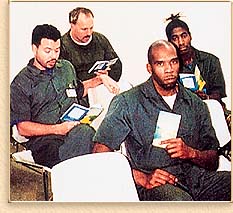

 The mission of Criminon is simple if formidable – to wipe out crime by eradicating the factors that create criminal behavior.
The mission of Criminon is simple if formidable – to wipe out crime by eradicating the factors that create criminal behavior.

stablished in 1970 in New Zealand, the Criminon program consists of a precise sequence of steps, each one bringing about specific results in the individual. Growing out of the worldwide Narconon (“no drugs”) drug rehabilitation program, Criminon operates within correction systems throughout the United States and in other nations to rehabilitate criminals by restoring their sense of self-worth so that they can become productive members of society.
On-site Criminon courses begin with practical instruction in how to communicate. That is followed with a course in learning how to learn, and continues with courses that include one based on The Way to Happiness. Each precept in the booklet is studied so that an inmate not only understands how it applies to his own life, but so he actually can utilize the precept to increase the survival potential of himself and others. (See “The Way to Happiness”.)
The Way to Happiness helps to restore a person’s innate goodness and pride. A person on the Criminon program soon discovers he is the one in charge. Pride and self-trust return upon recognition of the betrayal of his own essence, the breaking of the one contract he must not break: the contract with himself. One corrections officer described this course’s success with the offenders under his care as “dramatic” and noted, “Extraordinarily, they now feel remorse for what they have done in the past.”
In addition to on-site programs, during any given week, some 1,700 inmates are enrolled on Criminon correspondence courses at more than 600 U.S. prisons. Criminon graduates who have started successful businesses after leaving prison and who are today crime-free and productive members of society serve as evidence that something indeed can be done about the crime problem. One man, for example, today owns and operates a bakery, while another runs a greeting card business he started in prison.
Reversing the Trend of
Violence, Crime and Drugs
The graduates themselves attest to the program’s workability – as documented by filing cabinets full of letters and success stories sent to Criminon offices.
Whether the program is administered by correspondence or in person, the results are remarkable. In a world plagued by violence, crime and drugs, Criminon is reversing that trend.
A study of juvenile offenders in Alabama exposed to only a part of the Criminon program, for instance, found a sharp reduction in recidivism – to roughly 10 percent. Of a comparable control group not exposed to the program, the usual 80 percent were recidivist.
A Florida county court judge who visited the Ensenada facility said, “I saw some of Mexico’s worst prisoners, hardened criminals, who had been addicted to heroin for years before this program acting and talking like Eagle Scouts. They had genuine hope and enthusiasm for life. They were winning. I believe every prisoner in America needs the opportunity to experience this technology.”
Because of the men and women who encourage and administer the Criminon program within the corrections system, today there is a way to rehabilitate the criminal – to restore his self-respect and make him into a productive citizen who is, perhaps for the first time in his life, an asset to his community.
Criminon’s past contributions and future potential were summed up by James Jacob, Supervising Detention Officer of the Los Angeles Juvenile Hall where a successful program has been in operation since March 1994. “Criminon is hope,” he said. “It’s something that we’re lacking in today’s society. The results of the program well exceeded our expectations in my unit, and I would therefore recommend Criminon to any corrections facility. I can only see good things coming from it.” 
|




 The mission of Criminon is simple if formidable – to wipe out crime by eradicating the factors that create criminal behavior.
The mission of Criminon is simple if formidable – to wipe out crime by eradicating the factors that create criminal behavior.

